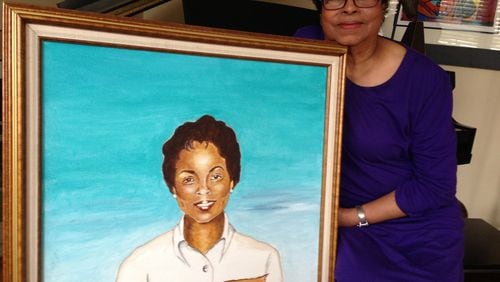We adults are easily fooled because we want to be fooled. It helps us get through the day, to look in the mirror and like what we see.
Children, though, are different.
When they’re young, they don’t realize that it can be dangerous to look too closely at the world, and so children look at everything.
I was reminded of this recently while talking with Roslyn Pope, who grew up in segregated Atlanta, but who at 13 had seen enough of this city too busy to hate to know there was hatred all around her.
She saw it in the segregated schools, at the whites-only water fountains, in the movie theaters, and throughout the neighborhoods. But Pope had also seen enough of the world to know what could be; that blacks didn’t have to be treated, indeed shouldn’t be treated, as second-class citizens.
The idea came to her for the first time in 1951 when she was chosen to represent the state of Georgia at a national Girl Scout encampment in Cody, Wyo.
Pope was a member of the District V Girl Scouts, the first African-American troop in Atlanta.
That year, she was the only black among some 50 girls from across the country meeting in Wyoming.
"They couldn't believe it was Georgia that had sent a black Girl Scout to the meeting, but they were so welcoming," she remembered recently. "Everybody wanted to get to know me. It was the first interracial contact that I had experienced, and it was far different from the way that I lived in Atlanta. It gave me a different perspective on life and the possibilities for an integrated society."
That perspective was reinforced years later when Pope was named a Merrill scholar during her sophomore year at Spelman College.
As such, she spent a year in Paris, studying classical piano and French, as well as traveling throughout Europe. There, too, she was treated as an equal.
“No one tried to avoid me,” she said. “They didn’t tell me I couldn’t eat in restaurants or ride at the front of the bus. I felt as if the shackles had come off. It changed my life.”
She returned to Atlanta just prior to the courageous actions undertaken by four Greensboro, N.C, college students who staged sit-ins at Woolworth, eventually forcing the department store to desegregate its lunch counters.
Pope, Spelman’s student body president, was primed for a movement.
“I’d come from an enlightened environment back to segregation,” she said.
Her first day back, she was sitting in Yates and Milton Drug Store, then the meeting place for students in the Atlanta University Center, when she was approached by Julian Bond and Lonnie King, both students at Morehouse.
Have you heard about Greensboro? they asked her.
Yes.
Would she join them in staging a similar protest?
Yes, I’m ready.
When the AU center presidents got wind of the plan to stage their own protests, a meeting was called with Pope and other student leaders. Rather than just protesting, the students were asked to first write a manifesto that detailed their grievances and the actions they planned to take in order to redress those grievances.
It fell to Pope to write the appeal “to end the scourge of segregation” that set in motion the Atlanta Student Movement. The founding group was known as Committee on the Appeal for Human Rights.
The appeal, published in this newspaper, targeted education, law enforcement, hospitals and employment practices, drawing the ire of then-Gov. Ernest Vandiver, as well as very favorable international attention.
In many ways, she said, the student protests were symbolic; they were never really about eating at lunch counters or Rich’s famed Magnolia Room. They were about far more serious issues, which are outlined in “the Appeal.”
“We were Rich’s credit card carriers,” she said. “We spent money there, but we couldn’t try on anything.”
Eventually, black Rich’s card holders would turn in their cards to the Atlanta Student Movement to force Rich’s to end its discriminatory practices.
Six days after the appeal was published on March 9, 1960, the protests began.
Two months later, Pope graduated, leaving it to her fellow students to finish what she’d started.
She would soon marry and move to Fort Lauderdale, Fla., where she spent several years teaching music, English and French in the Broward County public schools before heading to the Cleveland Institute of Music. Eventually she returned to Atlanta, where she received a master’s degree in English at Georgia State University.
In 1974, Pope earned a doctorate in humanities from Syracuse University, and after a short stint on the faculty at Penn State, she left to teach at Bishop College in Dallas.
“I felt that my education would be put to better use if I were at a black college,” she said.
When Bishop fell on hard times, Pope accepted a teaching position in the Dallas public schools and junior colleges.
Additionally she spent some years in the corporate culture as an advertising consultant, once again leading the integration of a company.
Today at 77, she is semiretired and perplexed by racial animosity brewing in her community, nation and world.
“In many ways, we’ve gone backward,” Pope said. “I wish we could go back and start over again, broadening our understanding of each other and the world.”
I wish we could, too.







